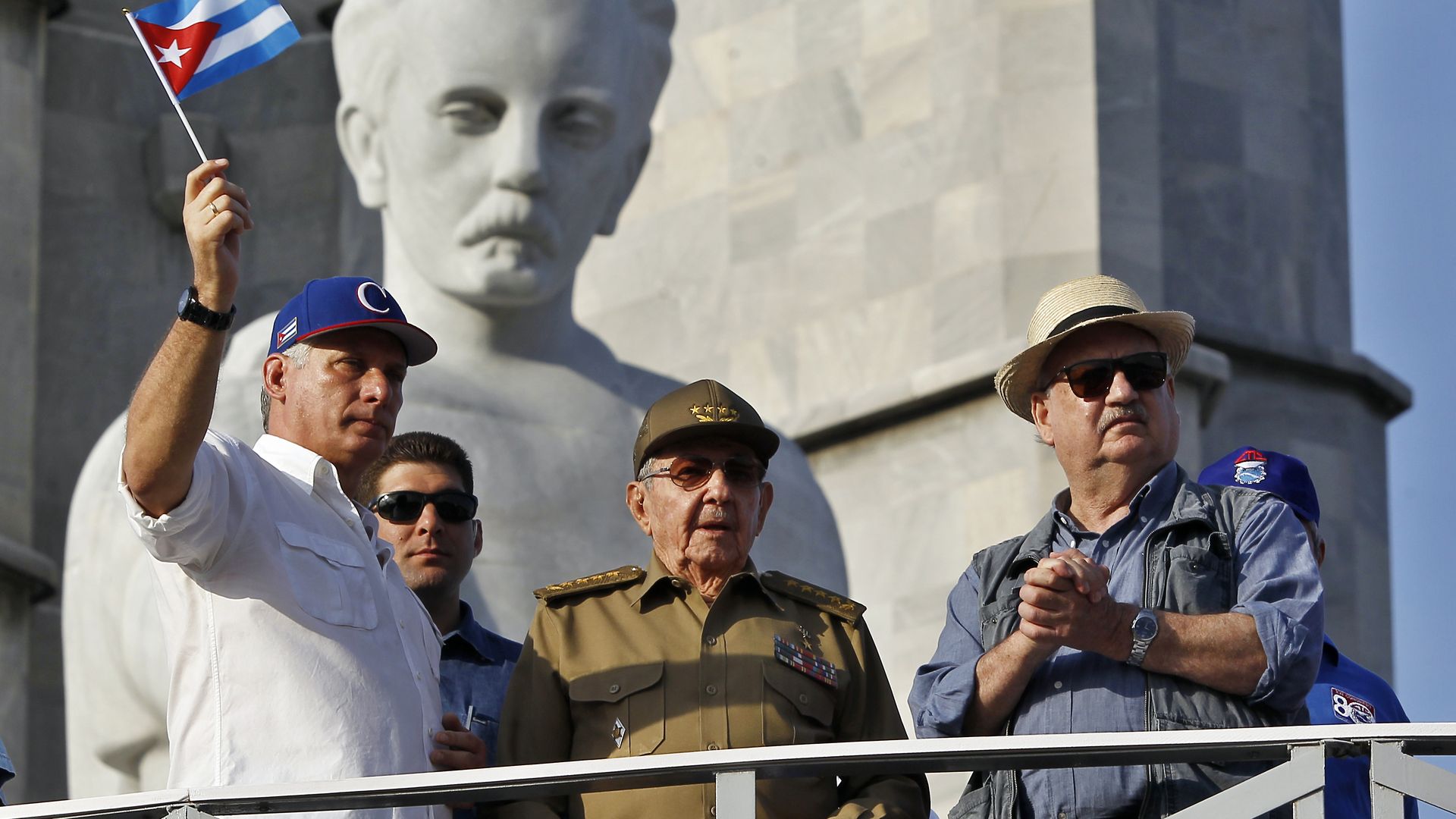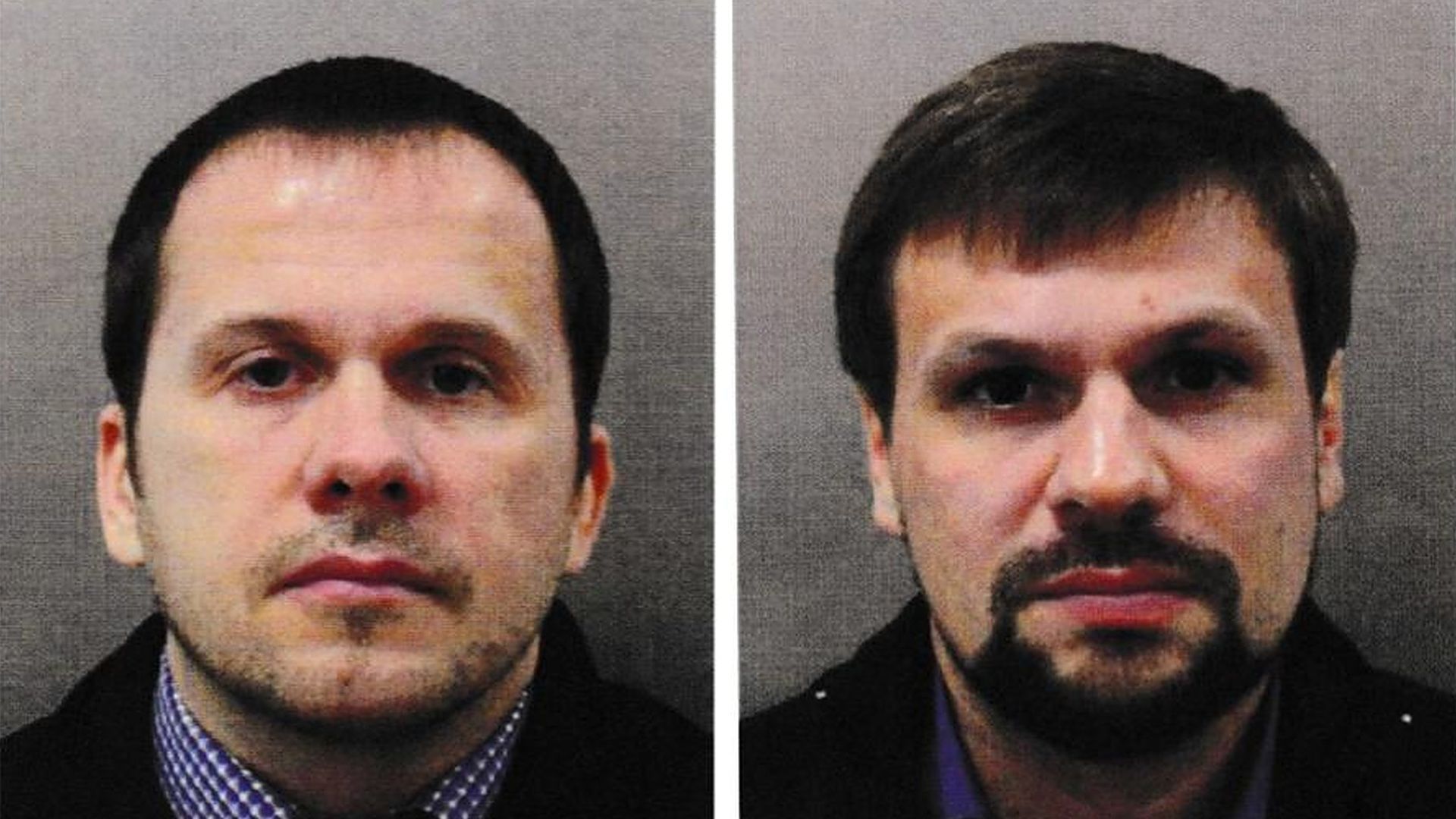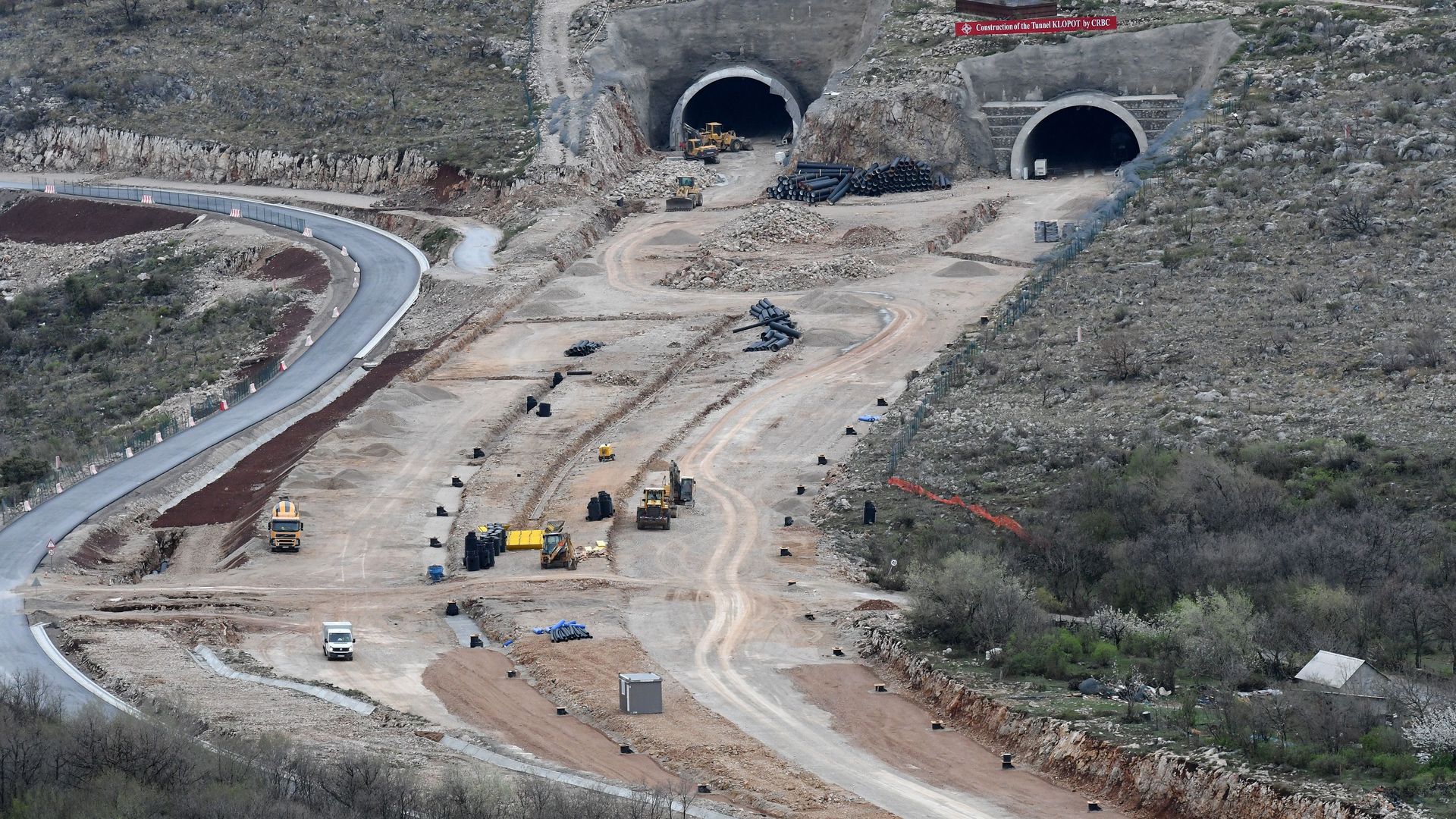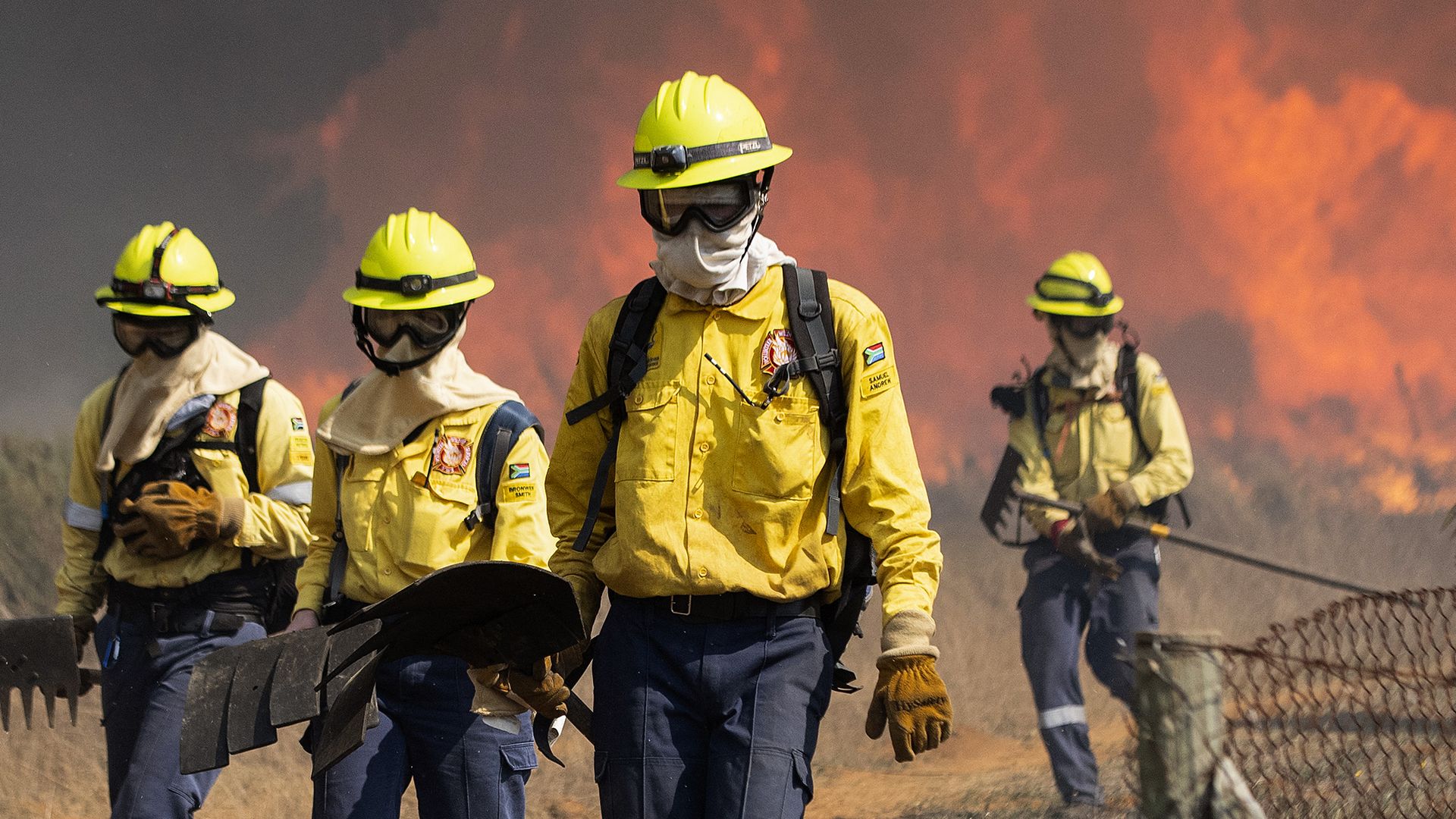| | | | | | | Presented By Blockchain.com | | | | Axios World | | By Dave Lawler ·Apr 19, 2021 | | Welcome back to Axios World. - I resisted the urge to focus tonight's edition (1,684 words, 6 minutes) on the new European Super League. The organizers and I don't see eye to eye on soccer, but we do share a commitment to including Tottenham whenever possible without any clear rationale for doing so.
- If you don't know what I'm talking about, read my colleague Kendall Baker's take, or just ignore it and hope, like the rest of us, that it goes away.
New arrival? Sign up. | | | | | | 1 big thing: Too many cases, not enough doses |  Data: Our World in Data; Chart: Axios Visuals More coronavirus cases are now being recorded globally each day than ever before in the pandemic, surpassing the previous global peak in early January. The big picture: At that time, the U.S. and Europe were driving the surge. This time, the biggest source of new cases is India. Driving the news: In cities like New Delhi, which imposed a new weeklong lockdown today, hospitals are overwhelmed, supplies like oxygen are scarce and morgues are overfull. - India is now recording more than twice as many cases each day than during the first wave in the fall, and in some cities, the rate of new infections has risen by as much as 16x in a single month, per AP.
India's spike has already had major global ramifications because vaccines that were set to be exported by the world's largest producer, the Serum Institute of India, have been kept for domestic use. - The institute's CEO is now calling on President Biden to reverse a ban on the export of raw materials needed to produce vaccines, which he says is contributing to shortages.
- India has now supplied one dose to around 8% of its population, but will likely be unable to ramp up quickly enough to vaccinate its way out of the current crisis.
Meanwhile, Chile — which has the highest vaccination rate in the Americas with 41% receiving at least one dose — is also experiencing a surge in cases. - Experts say political leaders and the public — both desperate for a return to normality — overestimated the level of protection provided by one dose of China's Sinovac vaccine, which turns out to be minimal, per WSJ.
- With two doses, though, the data shows the vaccine is 67% effective at preventing infection and 80% effective at preventing death.
- That suggests Chile should be able to reach herd immunity if it can keep up its rate of vaccination, but that will take longer than hoped. In the meantime, the current wave should be less deadly as many elderly people are protected.
The flipside: The vaccine effect is already clear in Israel, where new cases have fallen from an average of 3,954 per day six weeks ago to 167 per day now. - The U.K. is emerging from lockdown with increased confidence, as more than half the population and 90% of over-70s have had at least one shot. Deaths have fallen to around 25 per day from over 1,000 as recently as early February.
- Other European countries are trying to balance efforts to control the spread with the hope that fast-rising vaccination rates, combined with warmer weather, should bring outbreaks under control.
- Switzerland is loosening restrictions even with case counts remaining relatively high, and Greece is bringing back quarantine-free travel to boost the tourism sector ahead of what it hopes will be a big bounce back this summer.
In much of the world, though, cases are rising faster than are vaccination rates. - Iran, for example, is recording more cases than ever and more deaths than at any time since November. Both numbers are rising dramatically. Meanwhile, just 0.4% of the population has been vaccinated.
|     | | | | | | Expert Voices | | 2. Germany: Race to succeed Merkel takes shape |  | | | Annalena Baerbock. Photo: Andreas Gora/Pool/Getty Images | | | | Germany's leading political parties convened to nominate their candidates for chancellor on Monday, but while a bitter fight is still raging in the conservative camp at the time of writing, the Greens displayed no such drama in picking Annalena Baerbock. Why it matters: With Angela Merkel set to step down after 16 years following September's elections, there's a growing chance Germany's next chancellor will again be a woman, but this time Green, Sudha David-Wilp of the German Marshall Fund writes for Axios. The state of play: The conservatives — made up of the Christian Democrats (CDU) and their Bavarian sister party (CSU) — have seen their polling numbers slide amid a slow vaccine rollout and corruption scandals. - Now they're torn over whether to run recently elected CDU chair Armin Laschet, who is state premier of Germany's most populous state, or to buck convention and heed current polling, which favors the more media-savvy Bavarian leader, Markus Söder.
- The Greens are currently second in the polls, ahead of the center-left Social Democrats (SPD) and within striking distance of the conservatives.
The Greens will almost certainly play a part in Germany's next coalition government, whether that's a so-called traffic light coalition involving the SPD and the Free Democratic Party (FDP) or a centrist government with the Conservatives. - That means for the first since entering parliament in 1983, their candidate has a shot at becoming chancellor.
Baerbock, 40, is well-versed in foreign policy and represents a constituency in the former East Germany. - "I am running for renewal while others represent the status quo," she said at a press conference on Monday.
|     | | | | | | 3. Cuba: The Castros exit the stage |  | | | Diaz-Canel (L) with Raul Castro in 2018. Photo: Ernesto Mastrascusa/Getty Images | | | | The Castro era ended in Cuba today after six decades, with Raúl Castro handing over the reins of a party founded in 1965 by his brother Fidel. Why it matters: Miguel Díaz-Canel, 60, now assumes the challenge of maintaining Communist rule while grappling with growing discontent over Cuba's economic stagnation. Born after the revolution, Díaz-Canel contrasted with his predecessor at today's party conference, wearing a suit rather than military fatigues. - Díaz-Canel has emphasized continuity since becoming president in 2019, and he signaled today that he'd do the same as party chief.
- But he has already overseen an increase in internet access on the island and made it easier to start a business. More economic reforms along those lines could be forthcoming.
- One key question is how closely Biden will engage. There's little indication that outreach to Cuba will be a priority for the new administration as it was in Barack Obama's second term.
What to watch: Cuba is facing an uptick in coronavirus cases, but it hopes to soon be able to fight the outbreak with a homegrown vaccine. - That would be a major point of pride for Cuba, which has long overachieved in the medical field for an island of its size and relative poverty.
|     | | | | | | A message from Blockchain.com | | Worried you missed the boat on Bitcoin? It's not too late | | |  | | | | Blockchain.com allows you to buy, sell, trade, swap and earn cryptocurrencies like Bitcoin. The background: With over 70M Wallets in 200 countries, Blockchain.com is trusted by millions of people to trade, store and use crypto. So, what are you waiting for? | | | | | | 4. Global news roundup: Navalny in grave health |  | | | Alexander Petrov (L) and Ruslan Boshirov, who are suspected of carrying out attacks in England and the Czech Republic. Photo: Metropolitan Police via Getty | | | | 1. Russian opposition leader Alexei Navalny has been transferred to a hospital in another penal colony one day after his doctor warned he "could die at any moment." - Navalny is on week three of a hunger strike, though authorities said he was now taking vitamin supplements.
- What to watch: Navalny's supporters have called for large-scale protests on April 21, the same day that President Vladimir Putin is scheduled to deliver an annual state of the nation address to the national legislature.
2. Czech police on Saturday connected two Russian men suspected of carrying out the 2018 poisoning attack in Salisbury, England, with a deadly ammunition depot explosion in 2014 southeast of the capital, Prague. - Czech authorities officially blamed the Russian intelligence services for the blast, expelled 18 diplomats, and said they were searching for the Salisbury suspects.
- Russia responded by expelling 20 Czech diplomats.
3. Facing stinging criticism from progressives for keeping the Trump administration's historically low cap of 15,000 refugees for this year, the White House now says it plans to lift the cap by May 15. - Sens. Amy Klobuchar (D-Minn.) and Lindsey Graham (R-S.C) are calling on the Biden administration to help resettle one group of refugees in particular: Yazidi women who were the victims of a brutal Islamic State campaign in Iraq from 2014 to 2017, according to a letter shared with Axios. Go deeper.
4. The U.S. and China agreed Saturday to work together to tackle climate change, including by "raising ambition" for emissions cuts during the 2020s — a key goal of the Biden administration, Axios' Andrew Freedman reports. - The announcement came ahead of a climate summit Biden will be hosting on Thursday and Friday.
Go deeper: The U.S. credibility chasm on climate change |     | | | | | | 5. Interview: Afghan MP on America's exit |  | | | Biden announces the withdrawal. Photo: Andrew Harnik/Pool/Getty Images | | | | For many Americans, President Biden's decision to order the withdrawal of all U.S. troops from Afghanistan, ending a war that has cost $2 trillion and the lives of 2,400 service members, was good news 20 years in the making. - For many Afghans, it was "shocking" and "very hard to digest," Haji Ajmal Rahmani, a prominent member of the Afghan parliament, tells Axios' Zach Basu.
Why it matters: Rahmani believes the period leading up to Biden's announcement represented the best opportunity for peace in his country in decades. The backdrop: A peace conference was scheduled to take place in Istanbul on April 24 as part of a U.S.-backed push to accelerate intra-Afghan negotiations. - Rahmani and other Afghan stakeholders had been receiving signals that any decision by Biden would be conditions-based, as previous withdrawal efforts had been.
- Then came last week's news that Biden would withdraw all troops by Sept. 11 regardless of the military and political circumstances.
- Rahmani saw that as a major blow to the Afghan government, and he says the Taliban is now claiming victory, convinced they will be able to take back vast amounts of territory without having to return to the negotiating table.
Despite his initial despair, Rahmani says he respects Biden's decision and believes the situation can be "managed." - The Taliban remains vulnerable to diplomatic pressure points, like terrorist blacklists and the 7,000 prisoners still in the custody of the Afghan government. And robust international funding for the military, especially the Afghan Air Force, could be enough to at least hold the Taliban to a stalemate and force them to return to peace talks, Rahmani says.
- But without sufficient support, he argues, the preservation of women's rights, freedom of speech and any semblance of a stable Afghanistan are at serious risk.
|     | | | | | | 6. What I'm reading: Beijing's bridge to the Balkans |  | | | Highway construction. Photo: Savo Prelevic/AFP via Getty | | | | Montenegro took a $1 billion loan from China's Export-Import Bank in 2014 to build a highway to Serbia, and it brought in a Chinese company to do the building. Flash forward: The highway isn't yet completed, but the first payments are coming due. Now, the small Balkan state is looking to the EU — which warned Montenegro against accepting the loan — for a bailout. Between the lines: The project is complex, involving dozens of tunnels and bridges through mountainous terrain. Still, at $40 million per mile, critics say the price tag was "padded with extra cash for corrupt officials," the Washington Post's Michael Birnbaum writes. - Paying it back won't be easy, particularly during the pandemic downturn. It's unclear what exactly Montenegro put up as collateral, but Beijing could potentially seize valuable assets.
- The European Commission last week rejected a plea from Montenegro — a candidate to join the bloc — to help repay the loan. "We continue to stand by them, but we are not repaying the loans they are taking from third parties," a spokesperson said.
- Yes, but: Officials from France and Germany have since signaled that they will seek to help.
|     | | | | | | 7. Stories we're watching |  | | | Fighting a fire at the University of Cape Town. Photo: Rodger Bosch/AFP via Getty | | | - Pompeo, wife misused State Dept. resources, watchdog finds
- Israel thinks Biden will restore Iran deal
- Ontario backtracks on pandemic police powers
- Zimbabwe frees prisoners to reduce COVID risk
- Tens of thousands flee Nigeria attacks
- Italy's Salvini to face trial on migrant kidnapping charges
- Biden's likely pick for China ambassador
Quoted: "The super league is a good idea and will revolutionize football." — The view from an army of Twitter bots and, as far as I can tell, zero living people. |     | | | | | | A message from Blockchain.com | | Worried you missed the boat on Bitcoin? It's not too late | | |  | | | | Blockchain.com allows you to buy, sell, trade, swap and earn cryptocurrencies like Bitcoin. The background: With over 70M Wallets in 200 countries, Blockchain.com is trusted by millions of people to trade, store and use crypto. So, what are you waiting for? | | | | | | Axios thanks our partners for supporting our newsletters.
Sponsorship has no influence on editorial content. Axios, 3100 Clarendon Blvd, Suite 1300, Arlington VA 22201 | | | You received this email because you signed up for newsletters from Axios.
Change your preferences or unsubscribe here. | | | Was this email forwarded to you?
Sign up now to get Axios in your inbox. | | | | Follow Axios on social media:    | | | | | |
No comments:
Post a Comment